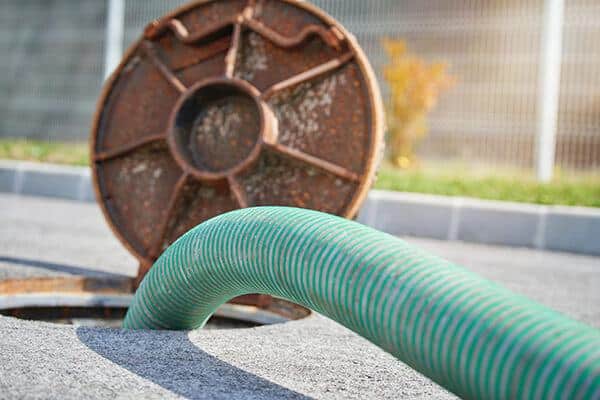
Is Bleach Bad for Septic Tanks? What You Need to Know
If you own a home with a septic system, you’ve probably asked yourself: is bleach bad for septic tanks? It’s a common question because bleach is a household staple used in cleaning, disinfecting and laundry. While bleach is effective at killing germs, it can also harm the delicate balance of bacteria in your septic tank which is essential for proper waste decomposition.
In this blog, we’ll explain how bleach affects septic systems, what the risks are and what you can do to keep your septic tanks healthy. We’ll also show how professional tank maintenance and cleaning services from experts like Upfront Septic & Plumbing can protect your system and prevent costly problems.
How Bleach Affects Your Septic Tank
A septic tank relies on a community of good bacteria to break down waste naturally. These bacteria digest solid waste and keep your system functioning efficiently. When you pour chlorine bleach or other harsh cleaning agents down the drain, you risk killing these essential bacteria.
Without these microorganisms, the bacterial balance in your tank is disrupted and your septic system can’t process waste properly. This can lead to clogs, unpleasant odors, sewage backups and expensive repairs. Even household cleaners and detergents labeled as “safe” can contain ingredients that disturb this balance if overused.
Key takeaway: Use bleach sparingly. While a small amount diluted in laundry water may not immediately damage your septic system, frequent or excessive use of disinfecting bleach can cause long-term harm.
How Much Bleach Is Safe for Septic Systems?
The general rule is moderation. A single load of laundry using a small cup of bleach is unlikely to hurt your septic tank. However, pouring large quantities of bleach, especially concentrated chlorine bleach, can overwhelm your system and eliminate too many of the bacteria your tank needs to operate.
If you notice slow drains, backups or odors around your tank, these can be signs that the bacterial balance in your septic system has been compromised. Regular septic maintenance and inspections can identify problems before they become major issues.
Household Cleaners and Your Septic System
Besides bleach, many cleaning products and detergents can impact your septic tank. Antibacterial soaps, disinfecting cleaners and harsh chemicals can kill the bacteria in your system just like bleach. Even products marketed as “septic safe” should be used in moderation.
Here are some tips for choosing cleaning products:
- Opt for biodegradable non-toxic cleaners whenever possible
- Avoid pouring drain cleaners, paint or solvents down the sink
- Use bleach only when necessary and always dilute it with water
- Rotate cleaning agents to prevent overloading your tank with one type of chemical
By following these steps, you’ll support a healthy septic system and avoid costly repairs.
Signs Your Septic System Needs Attention
Even with careful use of bleach and cleaners, every septic tank requires regular care.
Watch for these warning signs:
- Slow-draining sinks, tubs and toilets
- Foul odors around your tank or drain field
- Pooling water near your septic system
- Sewage backups inside or outside your home
If any of these occur, it’s time to schedule septic maintenance. Ignoring these signs can lead to extensive damage and expensive repairs.
How Professional Cleaning Services Help
Upfront Septic & Plumbing specializes in septic tank maintenance, pumping and repair services. Their team can:
- Inspect your septic system for early signs of trouble
- Pump your septic tank to prevent clogs and backups
- Advise on safe cleaning practices for your home
- Ensure the long-term health of your septic tanks
By hiring experts for tank maintenance and regular cleaning services, you protect your home, your system and your wallet. Professionals use methods that maintain the bacterial balance in your tank unlike harsh chemicals that can harm your system.
Hire Upfront professionals now!
Best Practices for Septic System Care
To maintain a healthy septic system, follow these tips:
- Use bleach and cleaning agents sparingly
- Choose septic-safe cleaning products whenever possible
- Regularly inspect and pump your septic tank
- Avoid flushing non-biodegradable items such as wipes or feminine hygiene products
- Schedule professional cleaning services at least every 2-3 years depending on usage
Following these steps helps keep your septic tank and drain field functioning efficiently.
So, is bleach bad for septic tanks? Yes, if used excessively or improperly. A small, diluted amount may be safe, but overuse of chlorine bleach and other harsh cleaning agents can disrupt the bacterial balance in your tank. Maintaining your septic system with proper cleaning practices and professional tank maintenance is the key to avoiding expensive repairs.
If you want peace of mind and a septic system that works efficiently, trust the experts at Upfront Septic & Plumbing. Their professional cleaning services and maintenance plans are designed to protect your home and extend the life of your septic system. Don’t wait until a problem becomes an emergency. Schedule a service today.
Takeaway: Keep your home safe, your drains flowing and your septic tank healthy by using bleach carefully and investing in regular professional septic maintenance.
